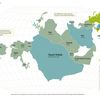There has been a recent circumstance where some of the occasionally reading public have noticed that in the bowels of the Fed's publications, in a series affectionately known as the H-Reports, that Non-Borrowed Reserves of the Banks went NEGATIVE last week. Oh my Lord, and heavens to betsy! This is surely a sign of impending insolvency, deflation, and probably the end of Life as we know it (TEOLAWKI).

We've grappled with this for serveral days now, not so much in trying to understand what is happening with the banks, which we think we understand, although there is enough opaqueness, if not outright deception, in the system to make us doubt just about everything, but rather, to try and figure out how to explain this to a group of readers who likely don't know much about central banks, monetary systems, and bank accounting. This is no deficiency on their part, and its probably healthy since we cannot think of a more useless waste of productive effort for those who are not specialist drones in some bureaucratic accounting structure, or a major university.
But since the bankers appear to be going wild, and the economists are either in retreat up in the hills or selling whiskey to the angry villagers on behalf of some political warlord, we seem to be in a position where trying to lend insight into this might be considered a duty. We take this up reluctantly, believe us, because both the goldbugs (said somewhat affectionately) and the deflationists (leave a magazine but please go away) are both holding up their torches and chanting. So if duty calls, we have decided not to belabor this one, but to just spit it out, provide a reference work for those who have extreme masochistic tendencies, and then run off to do more productive if not enjoyable things like making a living. Keep in mind this is a simplified explanation, will have a lot of technical holes in it, but the major foundations of the argument are pretty sound. We also wrote it at one sitting with no rewrites and precious little spell checking.
So if duty calls, we have decided not to belabor this one, but to just spit it out, provide a reference work for those who have extreme masochistic tendencies, and then run off to do more productive if not enjoyable things like making a living. Keep in mind this is a simplified explanation, will have a lot of technical holes in it, but the major foundations of the argument are pretty sound. We also wrote it at one sitting with no rewrites and precious little spell checking.
Banks are profit seeking, and to shareholders preferably profit maximizing in their behaviour. Put very simply, they have a portfolio of things they 'own' which they wish to use to generate profits. This implies that the must acquire things which is costly, and even the things they already own can cost plenty, as anyone who has ever married a trophy wife must surely know.
When banks put together that portfolio of things that they 'own' they consider the various costs of possessing or acquiring those things, and what they might get in return for doing things with them to generate some income, the net result being often referred to as 'profit.'
Doesn't that sound familiar? Portfolio? As in portfolio theory? Even the investor has often entertained the notion that if they have a portfolio of things, with different returns, risk, and maturities, they might have the ability to tinker with that combination to get the best bang for the buck, so to speak. That's where a little knowledge is dangerous, because the example of the individual goes sour pretty quickly when you start applying it to accounting for banks. But let's go with it a bit.
A bank can have a group of things it 'owns' including cash, Treasuries, loan portfolios, etc. Banks are the ultimate leverage machine. They don't like to hold reserves, because reserves are most often things that are not performing to their multiplying maximum. Very inconvenient and all that. In the UK as we recall, the reserve requirment is zero, but you better not miss it. in the US its some handwavy existential notion that people think of as 10 percent, but with sweeps and so forth its a little virtual. Still it does exist, and the Fed does track it.
Does it matter WHERE the reserves  come from? After all they must come from somewhere. Vault cash (ugh no return there) is one example. Banks, contrary to popular belief, hate cash. necessary evil and all that. Pesky stuff.
come from? After all they must come from somewhere. Vault cash (ugh no return there) is one example. Banks, contrary to popular belief, hate cash. necessary evil and all that. Pesky stuff.
As you probably know, banks borrow from each other to make reserve requirements (Fed funds rate or effective funds rate if you will) and from the Fed (Discount Rate).
What if the Fed created an extra groovily priced borrowing facility for the banks, that offered 1. privacy 2. ease of use with favorable durations and required collateral 3. a cost that is less than inflation.
Let's repeat number three. The Fed offers the stuff that banks use to make money, capital, and it does it for a cost that is less than inflation. Some might refer to that as 'free money.'
If you put enough of that into the system, what would happen? 1. The effective Fed Funds rate would drop faster than a local hardware store's prospects when the new Walmart gets built, 2. Relatively riskless investment returning even a little better than the super secret discount rate (aka TAF) would plummet in return as too much money chased them. 3. Relatively safe assets would start inflating as the search for return grew more intense.
If you don't believe us take a look at some of the whacky things going on with the yield curve, especially with the two to five year Treasuries since this is where the risk aversion return hungry genie is pointing.
This free money concept sounds great! Why don't they do it all the time? Beats working. Well, the trick is to provide free money without letting on that its free money, at least to the tourists, and especially your creditors who buy and hold your sovereign debt. Its a dollar dropping in value thing.
To do that you have to make people think there is less inflation than there really is. Check. Second thing you have to do is set up an opaque and somewhat exclusive mechanism by which you direct the 'free money.' TAF anyone? Anyone? Bueller?
So what else should a bank do. Acquire more depositors? Sure, and compete with money market funds, and scramble for high cost nickels when the Fed is offering low cost megabucks. Where's the unemployment line Rudy? The money machine is right down the hall in Ben's office.
What we are seeing are a lot of skewing and distorting of the data as the Fed takes extraordinary actions to push liquidity into the system by offering 'free money' to the part of the system where you want to put the juice to make things get moving again, the primary dealer banks. They would still like some non-supply side action in the form of a stimulus to consumers, but the Fed can't do that (yet) and must rely on Congress (where no stimulus goes forward without a hefty chunk for numero uno someway somehow).
This is NOT to say that there are not serious problems in the financial system. This is NOT to say that deflation is impossible (hey fiat cuts both ways and if the Fed raised Fed Funds, margin money and reserve requirments tomorroww to the max we'd probably see something in the ensuing chaos resembling deflation.
However, if and when the real cracks in the system show up, its unlikely to be in one of the H-series documents, as cool and esoteric as they might seem to someone who never looked at them before. They are not secret. They are on the web for God's sake.
The real problems will come like a thief in the night, and most likely with some exogenous shock from a foreign creditor, or an irrational panic like a market crash or a bank run that exposes the weakness hidden in the system. Well hidden until the tide goes out.
We warned you it would be simple, and full of technical holes, but it is sound. If you want the intermediate version read this free book online: Monetary Economics by Jagdish Handa. Its not the best but its fairly readable and the price is right.
As for the real source of the problem? Its not loose money. That's just a prerequisite.
We live in a time when lying is no longer considered dishonorable if you succeed in achieving your objective. It might even be your government sanctioned duty. Heck, you might be admired for it, get a really nice golden parachute, be knighted, or even elected president. And economists are no different, being sullied by their exposure to the marketplace, which is much more richly adorning than a quiet department office and admiring but amazingly similar students.
These are the times in which we live. We are no different than prior civilizations. We just are grading behaviour on a really exceptionally generous curve. No financier, lobbyist, businessman, or corrupt politician left behind.




 Agný
Agný
 Alfreð Símonarson
Alfreð Símonarson
 Andrea J. Ólafsdóttir
Andrea J. Ólafsdóttir
 Bjarni Harðarson
Bjarni Harðarson
 Bjarni Kjartansson
Bjarni Kjartansson
 Brynjar Jóhannsson
Brynjar Jóhannsson
 FLÓTTAMAÐURINN
FLÓTTAMAÐURINN
 Eygló Þóra Harðardóttir
Eygló Þóra Harðardóttir
 FreedomFries
FreedomFries
 Fríða Eyland
Fríða Eyland
 Georg P Sveinbjörnsson
Georg P Sveinbjörnsson
 Gils N. Eggerz
Gils N. Eggerz
 Gullvagninn
Gullvagninn
 Gunnar Skúli Ármannsson
Gunnar Skúli Ármannsson
 Guðrún María Óskarsdóttir.
Guðrún María Óskarsdóttir.
 Gísli Hjálmar
Gísli Hjálmar
 Hagbarður
Hagbarður
 Halla Rut
Halla Rut
 Haraldur Haraldsson
Haraldur Haraldsson
 Hlekkur
Hlekkur
 Ingibjörg Álfrós Björnsdóttir
Ingibjörg Álfrós Björnsdóttir
 Jens Guð
Jens Guð
 Jóhannes Ragnarsson
Jóhannes Ragnarsson
 Jón Aðalsteinn Jónsson
Jón Aðalsteinn Jónsson
 Jón Ragnarsson
Jón Ragnarsson
 Jón Steinar Ragnarsson
Jón Steinar Ragnarsson
 Karl Tómasson
Karl Tómasson
 Kári Magnússon
Kári Magnússon
 Loopman
Loopman
 Magnús Þór Hafsteinsson
Magnús Þór Hafsteinsson
 Promotor Fidei
Promotor Fidei
 Rúnar Sveinbjörnsson
Rúnar Sveinbjörnsson
 Salvör Kristjana Gissurardóttir
Salvör Kristjana Gissurardóttir
 Sandra María Sigurðardóttir
Sandra María Sigurðardóttir
 SeeingRed
SeeingRed
 Sigurbjörn Friðriksson
Sigurbjörn Friðriksson
 Sigurjón Þórðarson
Sigurjón Þórðarson
 Sigurður Þórðarson
Sigurður Þórðarson
 el-Toro
el-Toro
 Sveinn Ingi Lýðsson
Sveinn Ingi Lýðsson
 Tryggvi Hjaltason
Tryggvi Hjaltason
 TómasHa
TómasHa
 Túrilla
Túrilla
 gudni.is
gudni.is
 proletariat
proletariat
 Ívar Pálsson
Ívar Pálsson
 Ómar Ragnarsson
Ómar Ragnarsson
 Óskar Helgi Helgason
Óskar Helgi Helgason
 Óskar Þ. G. Eiríksson
Óskar Þ. G. Eiríksson
 Bara Steini
Bara Steini
 Birgir Rúnar Sæmundsson
Birgir Rúnar Sæmundsson
 brahim
brahim
 Brosveitan - Pétur Reynisson
Brosveitan - Pétur Reynisson
 Bwahahaha...
Bwahahaha...
 Gestur Kristmundsson
Gestur Kristmundsson
 Gunnar Helgi Eysteinsson
Gunnar Helgi Eysteinsson
 Gunnar Rögnvaldsson
Gunnar Rögnvaldsson
 Helgi Jóhann Hauksson
Helgi Jóhann Hauksson
 Hlini Melsteð Jóngeirsson
Hlini Melsteð Jóngeirsson
 Jakobína Ingunn Ólafsdóttir
Jakobína Ingunn Ólafsdóttir
 Katrín Snæhólm Baldursdóttir
Katrín Snæhólm Baldursdóttir
 kreppukallinn
kreppukallinn
 Kristín Magdalena Ágústsdóttir
Kristín Magdalena Ágústsdóttir
 Máni Ragnar Svansson
Máni Ragnar Svansson
 Morgunblaðið
Morgunblaðið
 Neo
Neo
 Ragnar L Benediktsson
Ragnar L Benediktsson
 Rauði Oktober
Rauði Oktober
 Skákfélagið Goðinn
Skákfélagið Goðinn
 Sveinn Þór Hrafnsson
Sveinn Þór Hrafnsson
 Þór Ludwig Stiefel TORA
Þór Ludwig Stiefel TORA
Athugasemdir
Hmmm? Nś er ég of vitlaus til aš skilja. Er žetta um skuldafjįrstöšu Bandarķkjanna og tilraun til aš klóra yfir hiš augljósa eša hvaš?
Jón Steinar Ragnarsson, 9.2.2008 kl. 23:08
Varasjóšir bandar. innlįnsstofnana eru fengnir aš lįni.
Segjum aš žś vildir koma žér upp varasjóši og fęrir ķ bankann og slęgir lįn fyrir honum. Žaš vęri žį ekki sérlega sannfęrandi varasjóšur eša hvaš?
Baldur Fjölnisson, 11.2.2008 kl. 09:31
Viš getum lķka oršaš žaš žannig aš jafnvel "fractional" ķ "fractional reserve banking" (gśgliš žaš) sé gufaš upp.
Baldur Fjölnisson, 11.2.2008 kl. 22:01
Bęta viš athugasemd [Innskrįning]
Ekki er lengur hęgt aš skrifa athugasemdir viš fęrsluna, žar sem tķmamörk į athugasemdir eru lišin.